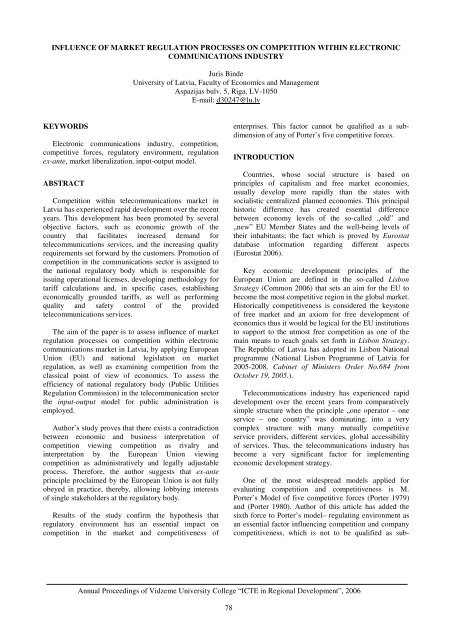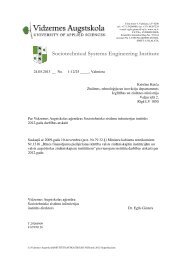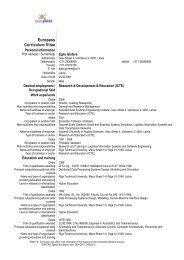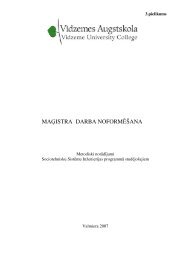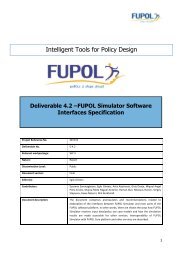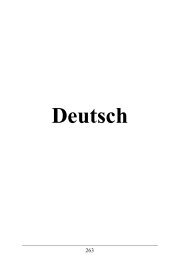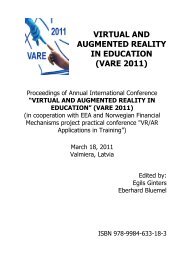INFLUENCE OF MARKET REGULATION PROCESSES ON COMPETITION WITHIN ELECTRONICCOMMUNICATIONS INDUSTRYJuris B<strong>in</strong>deUniversity of Latvia, Faculty of Economics and ManagementAspazijas bulv. 5, Riga, LV-1050E-mail: d30247@lu.lvKEYWORDSElectronic communications <strong>in</strong>dustry, competition,competitive forces, regulatory environment, regulationex-ante, market liberalization, <strong>in</strong>put-output model.ABSTRACTCompetition with<strong>in</strong> telecommunications market <strong>in</strong>Latvia has experienced rapid development over the recentyears. This development has been promoted by severalobjective factors, such as economic growth of thecountry that facilitates <strong>in</strong>creased demand fortelecommunications services, and the <strong>in</strong>creas<strong>in</strong>g qualityrequirements set forward by the customers. Promotion ofcompetition <strong>in</strong> the communications sector is assigned tothe national regulatory body which is responsible forissu<strong>in</strong>g operational licenses, develop<strong>in</strong>g methodology fortariff calculations and, <strong>in</strong> specific cases, establish<strong>in</strong>geconomically grounded tariffs, as well as perform<strong>in</strong>gquality and safety control of the providedtelecommunications services.The aim of the paper is to assess <strong>in</strong>fluence of marketregulation processes on competition with<strong>in</strong> electroniccommunications market <strong>in</strong> Latvia, by apply<strong>in</strong>g EuropeanUnion (EU) and national legislation on marketregulation, as well as exam<strong>in</strong><strong>in</strong>g competition from theclassical po<strong>in</strong>t of view of economics. To assess theefficiency of national regulatory body (Public UtilitiesRegulation Commission) <strong>in</strong> the telecommunication sectorthe <strong>in</strong>put-output model for public adm<strong>in</strong>istration isemployed.Author’s study proves that there exists a contradictionbetween economic and bus<strong>in</strong>ess <strong>in</strong>terpretation ofcompetition view<strong>in</strong>g competition as rivalry and<strong>in</strong>terpretation by the European Union view<strong>in</strong>gcompetition as adm<strong>in</strong>istratively and legally adjustableprocess. Therefore, the author suggests that ex-antepr<strong>in</strong>ciple proclaimed by the European Union is not fullyobeyed <strong>in</strong> practice, thereby, allow<strong>in</strong>g lobby<strong>in</strong>g <strong>in</strong>terestsof s<strong>in</strong>gle stakeholders at the regulatory body.Results of the study confirm the hypothesis thatregulatory environment has an essential impact oncompetition <strong>in</strong> the market and competitiveness ofenterprises. This factor cannot be qualified as a subdimensionof any of Porter’s five competitive forces.INTRODUCTIONCountries, whose social structure is based onpr<strong>in</strong>ciples of capitalism and free market economies,usually develop more rapidly than the states withsocialistic centralized planned economies. This pr<strong>in</strong>cipalhistoric difference has created essential differencebetween economy levels of the so-called „old” and„new” EU Member States and the well-be<strong>in</strong>g levels oftheir <strong>in</strong>habitants; the fact which is proved by Eurostatdatabase <strong>in</strong><strong>format</strong>ion regard<strong>in</strong>g different aspects(Eurostat 2006).Key economic development pr<strong>in</strong>ciples of theEuropean Union are def<strong>in</strong>ed <strong>in</strong> the so-called LisbonStrategy (Common 2006) that sets an aim for the EU tobecome the most competitive region <strong>in</strong> the global market.Historically competitiveness is considered the keystoneof free market and an axiom for free development ofeconomics thus it would be logical for the EU <strong>in</strong>stitutionsto support to the utmost free competition as one of thema<strong>in</strong> means to reach goals set forth <strong>in</strong> Lisbon Strategy.The Republic of Latvia has adopted its Lisbon Nationalprogramme (National Lisbon Programme of Latvia for2005-2008, Cab<strong>in</strong>et of M<strong>in</strong>isters Order No.684 fromOctober 19, 2005.).Telecommunications <strong>in</strong>dustry has experienced rapiddevelopment over the recent years from comparativelysimple structure when the pr<strong>in</strong>ciple „one operator – oneservice – one country” was dom<strong>in</strong>at<strong>in</strong>g, <strong>in</strong>to a verycomplex structure with many mutually competitiveservice providers, different services, global accessibilityof services. Thus, the telecommunications <strong>in</strong>dustry hasbecome a very significant factor for implement<strong>in</strong>geconomic development strategy.One of the most widespread models applied forevaluat<strong>in</strong>g competition and competitiveness is M.Porter’s Model of five competitive forces (Porter 1979)and (Porter 1980). Author of this article has added thesixth force to Porter’s model– regulat<strong>in</strong>g environment asan essential factor <strong>in</strong>fluenc<strong>in</strong>g competition and companycompetitiveness, which is not to be qualified as sub-Annual <strong>Proceed<strong>in</strong>gs</strong> of Vidzeme University College “ICTE <strong>in</strong> Regional Development”, 200678
dimension and <strong>in</strong>cluded with<strong>in</strong> any of the five forces(B<strong>in</strong>de 2006).Although over the recent years competitiveness <strong>in</strong>telecommunications sector <strong>in</strong> Latvia has experiencedrapid growth due to several objective factors, for<strong>in</strong>stance, economic development of the country result<strong>in</strong>g<strong>in</strong> <strong>in</strong>creas<strong>in</strong>g demand for telecommunication services and<strong>in</strong>creas<strong>in</strong>g quality requirements of the service set forth bycustomers, competition <strong>in</strong> the sector is not evaluated asvery strong. This is ma<strong>in</strong>ly determ<strong>in</strong>ed by specificity ofthe sector, as well as state policy for stimulat<strong>in</strong>gcompetition <strong>in</strong> the sector.In this paper the author has analyzed competition <strong>in</strong>the telecommunications sector as well as possibilities toregulate it from various aspects - its economic, legal andsocial <strong>in</strong>terpretation, as well as has assessed <strong>in</strong>fluence ofthe adm<strong>in</strong>istrative regulation on the telecommunications<strong>in</strong>dustry <strong>in</strong> Latvia.ECONOMIC INTERPRETATION OFCOMPETITION - DEFINITIONSEconomic and bus<strong>in</strong>ess <strong>in</strong>terpretations ofcompetitiveness are closely related and are associatedwith rivalry. Goods and services will be obta<strong>in</strong>ed fromthe company ensur<strong>in</strong>g, accord<strong>in</strong>g to customer, “more forthe same amount of money”. Thus, competition strives toremunerate the manufacturers and/or suppliers work<strong>in</strong>gmost efficiently and directs the economy towards moreefficient use of resources (Friedman 2000).From the bus<strong>in</strong>esses po<strong>in</strong>t of view competition is arivalry between manufacturers of goods present <strong>in</strong> themarket and/or service providers (merchants) for suchgoods manufactur<strong>in</strong>g and services provid<strong>in</strong>g terms thatwould ensure for them long-term profit.At the same time competition is a mechanism thatregulates proportions <strong>in</strong> manufactur<strong>in</strong>g. The two keyforms of competition are price and non-price. Theseforms of competition are active at a time and <strong>in</strong> mutual<strong>in</strong>teraction (Niedritis 2001) (page 6).Customer, who tak<strong>in</strong>g <strong>in</strong>to account its own <strong>in</strong>terest,chooses goods or services, ensures objectivity of anycompany’s evaluation. Competition is the most efficientand cheapest control method of economics that does notcost much to the public. Such control is an important anddynamic force and makes the manufacturer and seller toth<strong>in</strong>k and act <strong>in</strong> order to reduce costs and price, by<strong>in</strong>creas<strong>in</strong>g sales volume <strong>in</strong> order to improve quality ofgoods (services) and, what is most important, to fight forclients and orders (Niedritis 2001) (page 9).Un<strong>in</strong>terrupted improvement of processes and methodsunder healthy competition results <strong>in</strong> reduction ofexpenses. Consequently, quality of goods and services<strong>in</strong>creases. Innovation creates new and better approachesto production and service provid<strong>in</strong>g processes andspreads rapidly. Market players that are unable tocompete are forced to reorganize or to leave the market.Prices decrease due to <strong>in</strong>creased volumes and the marketexpands. Such, accord<strong>in</strong>g to Porter [8] is the pace ofdevelopment for well-function<strong>in</strong>g <strong>in</strong>dustries, for <strong>in</strong>stance,computers and <strong>in</strong><strong>format</strong>ics <strong>in</strong>dustry, mobiletelecommunications, bank bus<strong>in</strong>ess and many others.CIVIL RIGHTS AREA, REGULATION, ANDCOMPETITIONMerchant, when develop<strong>in</strong>g commercial policy andestablish<strong>in</strong>g commercial relations with clients,cooperation partners, suppliers acts <strong>in</strong> the area of civilrights.Pr<strong>in</strong>ciple of private autonomy is the ma<strong>in</strong> pr<strong>in</strong>ciple <strong>in</strong>the area of civil rights, which establishes that eachsubject of civil rights may act freely by us<strong>in</strong>g its owndiscretion. This <strong>in</strong>cludes also the freedom to establish oravoid establish<strong>in</strong>g legal relations with other persons byus<strong>in</strong>g one’s own subjective judgement.Yet, the freedom guaranteed by pr<strong>in</strong>ciple of privateautonomy has restrictions (Porter 2004). Restrictions toprivate autonomy set by the state are very different andserve different purposes – especially for protection of theother contract<strong>in</strong>g party, ensur<strong>in</strong>g rights of m<strong>in</strong>ority <strong>in</strong>associations of persons or protection of other public<strong>in</strong>terests.Depend<strong>in</strong>g on the specific public <strong>in</strong>terest, the stateprovides for different imperative restrictions of different<strong>in</strong>tensity, prohibitions to perform certa<strong>in</strong> activities aswell as performs regulation of activities <strong>in</strong> specific<strong>in</strong>dustries. In the first case the respective merchant has anobligation to obey norms of legislation and respectrestrictions imposed by the state, while the state<strong>in</strong>stitutions supervise adherence to the respective norms(ex-post regulation).However, <strong>in</strong> the second case state <strong>in</strong>stitutions monitormarket development regularly and impose regulat<strong>in</strong>gduties on a merchant, based on its economic status <strong>in</strong> themarket, to avoid competition problems <strong>in</strong> future (ex-anteregulation).Regulation as a state supervision and controll<strong>in</strong>gmeans <strong>in</strong> Western-type economics is characteristic only<strong>in</strong> very specific cases, to satisfy specific public needs.The Oxford Dictionary for the Bus<strong>in</strong>ess World (TheOxford 1993) def<strong>in</strong>es the term „regulation” asgovernment rules that govern decisions of companies,especially monopolies or oligopolies, to elim<strong>in</strong>ate use oftheir market status for gett<strong>in</strong>g unfair benefit. Regulationmight be perceived as an alternative to nationalisation,Annual <strong>Proceed<strong>in</strong>gs</strong> of Vidzeme University College “ICTE <strong>in</strong> Regional Development”, 200679
- Page 1 and 2:
ISBN 9984-633-03-9Annual Proceeding
- Page 3 and 4:
“Development of Creative Human -
- Page 5 and 6:
TABLE OF CONTENTSINTELLIGENT SYSTEM
- Page 7 and 8:
INTELLIGENT SYSTEM FOR LEARNERS’
- Page 9 and 10:
LEARNER 1GROUP OF HUMAN AGENTSLEARN
- Page 11 and 12:
QuantityQuantityFigure 6. Distribut
- Page 13 and 14:
LEARNERStructure of theconcept mapL
- Page 15 and 16:
WEB-BASED INTELLIGENT TUTORING SYST
- Page 17 and 18:
materials to be presented and which
- Page 19 and 20:
INFORMATION TECHNOLOGIES AND E-LEAR
- Page 21 and 22:
correspondence with the course aim
- Page 23 and 24:
projects and through IT. Hence, it
- Page 25 and 26:
APPLICATION OF MODELING METHODS IN
- Page 27 and 28:
can support configuration managemen
- Page 29 and 30:
The EKD is one of the Enterprise mo
- Page 31 and 32:
CHANGES TO TRAINING AND PERSPECTIVE
- Page 33 and 34: or an end, yet none of these attitu
- Page 35 and 36: make decisions. It cannot be volunt
- Page 37 and 38: logs), data and video conferencing
- Page 39 and 40: Ability to follow user’s multi-ta
- Page 41 and 42: CONCLUSIONSEDUSA method gives us a
- Page 43 and 44: in successful SD. Given this situat
- Page 45 and 46: SPATIAL INFORMATIONFor the visualis
- Page 47 and 48: MOBILE TECHNOLOGIES USE IN SERVICES
- Page 49 and 50: learning environment (Learning Mana
- Page 51 and 52: ago only some curricula on Logistic
- Page 53 and 54: The Web-based version can be access
- Page 55 and 56: Web-portal, which incorporates diff
- Page 57 and 58: DO INTELLIGENT OBJECTS AUTOMATICALL
- Page 59 and 60: Table 1. Examples for introducing R
- Page 61 and 62: workable influencing of the process
- Page 63 and 64: are handed over to the objects and
- Page 65 and 66: • Basic processes, such as wareho
- Page 67 and 68: THE ECR E-COACH: A VIRTUAL COACHING
- Page 69 and 70: participating in the workshops and
- Page 71 and 72: • Assessment modules enable indiv
- Page 73 and 74: with pictures and illustrated graph
- Page 75 and 76: ECR Question Banknumber category su
- Page 77 and 78: educational programme that follows
- Page 79 and 80: DEVELOPMENT OF WEB BASED GRAVITY MO
- Page 81 and 82: These results of a model require a
- Page 83: CONCLUSIONSThe main goal of work ha
- Page 87 and 88: • Resources sharing by providing
- Page 89 and 90: Pursuant to the guidelines of elect
- Page 91 and 92: tariffs of regulated services have
- Page 93 and 94: INFORMATION TECHNOLOGY FOR MOTIVATI
- Page 95 and 96: difficult to predict when and for w
- Page 97 and 98: Listeners' workon the WebListenersS
- Page 99 and 100: PERSPECTIVES OF WEB PAGE AND E-MAIL
- Page 101 and 102: INCREASE IN THE NUMBER OF INTERNETU
- Page 103 and 104: tourism accommodations (home pages
- Page 105 and 106: interactive relationships with clie
- Page 107 and 108: • The data obtained by the resear
- Page 109 and 110: Central Statistical Bureau of Latvi
- Page 111 and 112: departures for 1995 are taken from
- Page 113 and 114: 120100maximumworldminimum806040200-
- Page 115 and 116: 140120maximumworldminimum1008060402
- Page 117 and 118: would be a promising extension. Cur
- Page 119 and 120: AN OVERVIEW OF THE AGENT − BASED
- Page 121 and 122: Suitability for social system simul
- Page 123 and 124: 6. MASONDescription:MASON is a fast
- Page 125 and 126: Suitability for social system simul
- Page 127 and 128: could be bad particularly when over
- Page 129 and 130: (for 10 repeat &| CCar[]->runfor);P
- Page 131 and 132: • Streaming audio• Collaboratio
- Page 133 and 134: NECESSITY OF NEW LAYERED APPROACH T
- Page 135 and 136:
Up to now, there has only been limi
- Page 137 and 138:
aaaaa6= −aa2,1 = − a0,3226= −
- Page 139 and 140:
∂ u∂x∂ u∂y2 2+ b = 02 2wher
- Page 141 and 142:
a6,3= −2030a4,5−130a4,3- - - -
- Page 143 and 144:
0,10,20,30,4( )Mag x y y Ge wx2, =
- Page 145 and 146:
Example 1. To understand better the
- Page 147 and 148:
Therefore, further the following co
- Page 149 and 150:
SOLUTION OF THE THREE-DIMENSIONALEQ
- Page 151 and 152:
Mag1, m , m , m1 2 3= mm1 m2m32 2 2
- Page 153 and 154:
MagMag0, m , m , m1 2 31, m , m , m
- Page 155:
CONCLUSIONSThe basic content of thi


